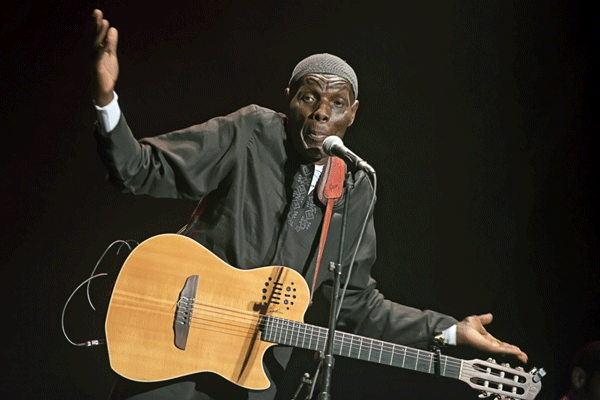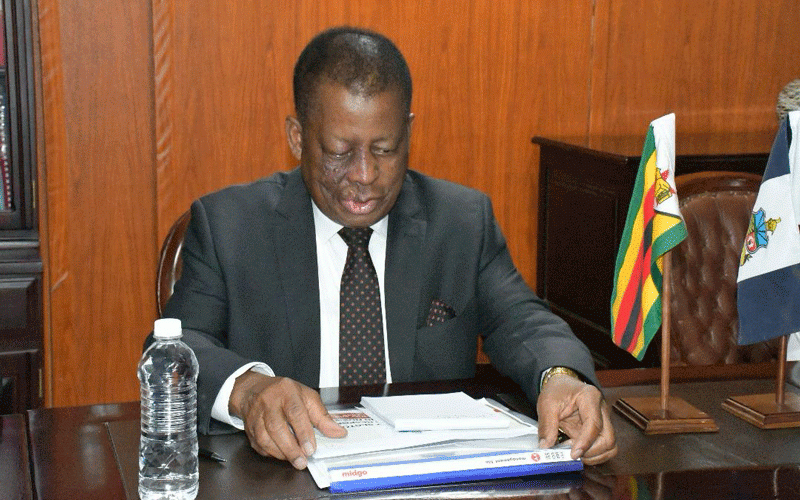
It was around 4pm on September 21 when Oliver Mtukudzi called me: “Hey professor, this is Tuku, I have been thinking about the people who know my history and are able to tell the story of my life to be the invited guests at my album launch tomorrow at 10am. I know you know my whole story, so could you please be my guest speaker at the album launch?”
in the groove with Fred Zindi
I was in the middle of marking some Masters’ degree students’ assignments and I needed time to think about his request. So, I said to him: “Let me call you back later when I have thought about it. I called back half an hour later and the phone was answered by Pakare Paye Arts Centre manager Watson Chidzomba who explained to me what Mtukudzi wanted and I began to agonise on what to say as Tuku has a long history.
Apart from the launch of his 65th album, Eheka! Nhai Yahwe, it was also his birthday on that same day — September 22. Although I was given very short notice to write a speech, I had no choice but to accept the request. Besides, given our long relationship in the music industry and because of my allegiance to my hero, it was almost impossible to refuse that request.
The next day I went to Pakare Paye for the album launch ceremony.
After a prayer from Reverend Muzarari and a few introductions from Daisy Mtukudzi, it was time for lunch. There was a big spread of chicken, beef, goat meat, pork, rice, sadza, potatoes, salads and desserts.To say that this food was delicious is an understatement. Indeed it was pleasing to the taste. Thanks to Daisy’s kitchen at Pakare Paye Arts Centre.
After lunch, it was time for my speech and I asked myself whether I should begin by saying how Tuku at the age of 10 danced on top of a table before his parents or whether I should talk about some of his 65 classic releases. The classics I remembered on the day included Chikonzi, Nyanga Ye Nzou, Shanda, Shoko, Ziwere, Chinhambwe, Ivai Navo, Mukombe We Mvura. Maungira, Tuku Music, Nhava, Rudaviro, Ndega Zvangu, Svovi Yangu, Dairai, Sarawoga, Ndega Zvangu, Paivepo, Bvuma-Tolerance, Vhunze Moto, Tsivo and Tsimba Itsoka. Where to begin and what to include in the speech became a big problem.
- Chamisa under fire over US$120K donation
- Mavhunga puts DeMbare into Chibuku quarterfinals
- Pension funds bet on Cabora Bassa oilfields
- Councils defy govt fire tender directive
Keep Reading
Should I start with his tours around the world? Since the 1990s Tuku has travelled all over the world plying his trade. Or should I talk about his collaborations with world famous artists such as Hugh Masekela, Taj Mahal, Baaba Maal, Carlos Santana, Louis Mhlanga, Steve Dyer, Lucky Dube and Ringo Madlingozi?
I thought the best strategy was to talk about the things which I believe genuinely moved Tuku during his 40-year music adventure such as the many awards he received which included Zimbabwe Media Awards, National Arts and Merits Award, Reel Award, MTN Sama Award, Italian Order of Merit Award and Kora Award.
I quizzed myself on whether I should include the fact that in 2013, he became the Unicef’s regional goodwill ambassador for eastern and southern Africa and that in the same year he was inducted into the Afro-Pop Hall of Fame in New York in the United States after performing in front of 10 000 fans at the Central Park Summer Stage festival. The superstar seemed genuinely moved by the acknowledgement when he received the honour from Georges Collinet of Afropop Worldwide. 2013 was also an important year for Tuku as he appeared on the front page of the prestigious and important international Time magazine, which to me, showed that he had achieved international recognition.
In addition, the superstar was honoured with a doctorate in Ethnomusicology and Choreography by the Great Zimbabwe University.
He is also behind the construction of Pakare Paye Arts Centre which houses the Sam Mtukudzi Conference Centre, a music performance venue, overnight accommodation, a restaurant, a state-of-the-art music recording studio and rehearsal rooms. I thought to myself it will take a whole book to mention all his achievements. I needed 40 hours to write the speech. Besides, I thought to myself, the people I will be addressing probably know all these facts already.
I threw that speech away and stuck to themes which the audience had little or no knowledge of, such as why Tuku was not granted a University of Zimbabwe accolade and why his latest release of Eheka! Nhai Yahwe in Zimbabwe boosted the piracy market and above all, I wrote about his late discovery of his wife, Daisy as a singer who collaborated with him on Haasi Masanga Bodo. Instead of paying backing vocalists from outside, this could have helped save the family’s money.
Album launches which include cocktail functions kill my soul. On August 12, I attended Jah Prayzah’s Mdhara Vachauya album launch, but I was not speaking. At these functions you always meet men and women with confident laughs who say dishonestly, “Oh, so good to see you, you look fabulous!” There are always strangers who seem so comfortable with small talk or those people who are always pushing a business card in every hand that is not holding a drinking glass. After Mtukudzi’s album launch, I sat at my desk and emptied my pockets to count about 20 business cards, some with names like Musikavanhu, Everisto and Mapungwana. I tried to remember who Musikavanhu was. Was it the man from Chinhoyi who sells potatoes or is it the one who was standing next to Stanley Kasukuwere? It doesn’t matter because I do not think that I will ever call them. I vividly remember Sam Mataure, Dominic Benhura, Sulumani Chimbetu, Terence Mapurisana, Munya Viyali, Kasukuwere, Bob Nyabinde, Fashionist Jackie, Enock Piroro, Mthandazo Dube and journalists from various media houses being at the function.
I had better stop here, lest Trust Khosa, a reporter at H-Metro, starts to label me Mambara of the Week.
Feedback: [email protected]












